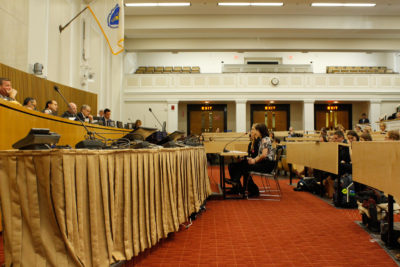By Alana Fialkoff and Kaylie Felsberg

Massachusetts legislators, healthcare providers and activists convened on Tuesday morning at the State House for a hearing that discussed a redraft of a bill which would guarantee women access to no-copay contraceptives.
The bill, which relates to the advancing contraception coverage and economic security in Massachusetts, is known as the Contraceptive Access Bill. If it passes, it would protect and expand access to contraceptives for Massachusetts residents.
The bill would require insurers to cover all Food and Drug Administration approved contraceptive methods, including over-the-counter contraceptives without a prescription, according to the Massachusetts Planned Parenthood website. The bill comes in response to the speculation whether national legislators will cut a similar provision that is currently included in the Affordable Care Act.
Tricia Wajda, the spokesperson at the Planned Parenthood League of Massachusetts, said before the hearing there is a level of urgency with this bill because of what is happening in the capital.
“Birth control is basic preventive health care and we want to make sure regardless of what happens in D.C., women in Massachusetts have the ability to stay healthy,” Wajda said. “This ensures women will continue to have affordable birth control and allow them to plan families, pursue educational and work opportunities, and keep themselves healthy.”
The bill was endorsed by coalition partners and health plans such as PPLM, NARAL Pro-Choice Massachusetts, American Civil Liberties Union of Massachusetts, Blue Cross Blue Shield Massachusetts and Massachusetts Association of Health Plans.
At a press conference preceding the hearing, sponsors and corporate endorsers of the bill said they hoped it would improve access to basic preventive care in Massachusetts and provide momentum for continued national progress.
Rep. John Scibak said access to contraceptives affects everyone.
“The issue is this is not a women’s issue,” Scibak said. “This is an issue affecting families and everyone in the Commonwealth.”
Jennifer Childs-Roshak, the president and CEO of PPLM, said the bill fights the tendency for politics to influence healthcare decisions.
“We are facing a classic case of politics dictating healthcare decisions,” Childs-Roshak said. “That’s why this Access bill is a common-sense, nonpartisan policy that the people of Massachusetts need.”
Rebecca Hart Holder, executive director of NARAL Pro-Choice Massachusetts, said the bill’s gravity lies in its humanitarian aim.
“Too many women in Massachusetts are teetering on the edge of losing [contraceptive] protections because of what is happening in Washington,” Hart Holder said.
Carol Rose, the executive director of ACLU of Massachusetts, said the goals of the bill reaches further than improving healthcare solely in Massachusetts.
“We [formed this bill] to set an example for the rest of the country, and for the world,” Rose said. “All eyes are on Beacon Hill to do the right thing and pass this contraceptive act quickly.”
After the press event for the bill, a hearing immediately took place where supporters testified before the Joint Committee on Financial Services.
Hart Holder said this hearing is an opportunity for Massachusetts to lead with progressive policy that goes beyond the protections of the ACA and to be the resistance to the presidential administration the country needs.
“Our office stands ready and remains vigilant for whatever may happen the federal level,” Hart Holder said.
Massachusetts is now currently leading the forefront in making sure 1.4 million women are safeguarded in having access to no-copay birth control, according to Planned Parenthood’s website.
Several attendees said they supported the Access bill for various reasons.
Abby Belyea, a Brandeis University senior, said after the press event she was a member of Brandeis Pro-Choice Club and said it’s significant for states to secure the rights of their citizens.
“Especially with this [presidential] administration, [women’s] rights could be restricted,” the 21-year-old said. “It’s really important for states to take control and protect their citizens.”
Lindsay Sabadosa, 36, of Northampton, said she had to begin birth control when she was 10 years old due to debilitating menstrual cramps. This personal connection motivated her to attend the hearing.
“That is something our representatives don’t realize, that contraception is so broad and is used by all people,” Sabadosa said after the hearing. “It is not just a question of birth control, so I wanted to make sure that point of view was heard as well.”
Meaghan Mort, 32, of Marston Mills, said she was homeless at 15, and birth control helped her when she started to become sexually active at 16 by allowing her to continue her education.
“My hope for this bill is that it will go forward, it will get more support within the Massachusetts State Legislator and that we won’t have to worry about fighting this every time the legislator is in session,” Mort said after the hearing. “It’s a waste of time to keep doing this, so let’s save money, save time, and get this thing done.”


















































































































